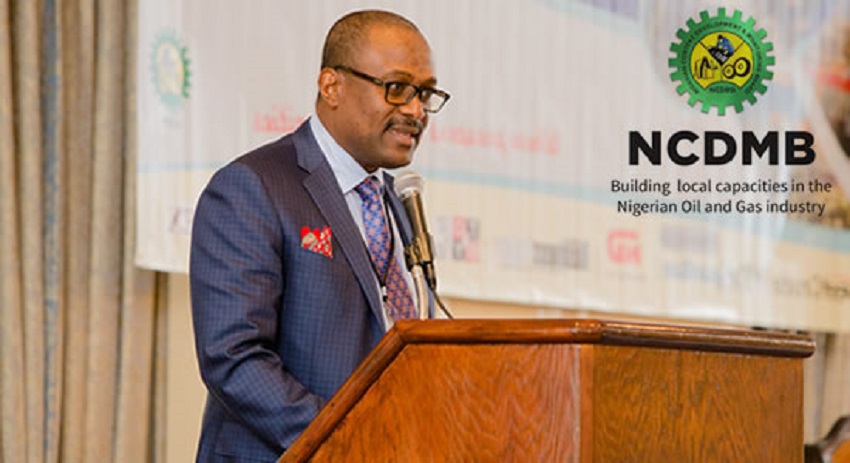Economy
Nigeria’s Content Board Shares $21m NCI Fund to Vendors

By Modupe Gbadeyanka
Minister of State for Petroleum Resources, Mr Emmanuel Ibe Kachikwu, and the Group Managing Director of the Nigerian National Petroleum Corporation (NNPC), Mr Maikanti Kacalla Baru, led other industry leaders to commend the Nigerian Content Development and Monitoring Board (NCDMB) for the numerous achievements recorded in the implementation of Nigerian Content in the oil and gas industry.
They spoke Tuesday at the 8th Practical Nigerian Content Workshop, organised by the NCDMB and CWC, in Yenagoa, Bayelsa State and pledged support to deepen the implementation of policies and initiatives that would increase in country value addition in the oil and gas sector.
According to Mr Kachikwu, the impact of Nigerian Content in the oil industry has stimulated other sectors like Information & Communication, Automobile, Construction and Power to adopt some of the templates in their policy formulations.
“We are also proud that some African countries like Kenya, Congo Brazzaville and Uganda as well as Gabon and Angola have come to Nigeria in the past for mentorship on Local Content initiatives,” he added.
The Minister, who was represented by the Permanent Secretary in the Ministry of Petroleum Resources, Mrs Folashade Yemi, promised the commitment of the Federal Government to promoting robust private sector participation in the oil and gas sector and ensuring ease of doing business in the economy in general.
Also speaking, Mr Baru said NNPC was pleased to see the achievements of Local Content in various sectors of the Nigerian economy.
He noted that in “in 2010, the available in-country capacity for line pipes was 100,000 metric tonnes, just 10 percent of the annual industry demand of one million MT/annum.
“However, today, through the robust collaboration of NCDMB with NNPC and other stakeholders, the capacity of line pipes has been ramped up to 420,000MT/annum, representing 40 percent of industry demand.”
The GMD reaffirmed “NNPC’s commitment to compliance with the provisions of the Nigerian Content Act, to increase in-country value addition and support job creation. We will also continue to encourage our partners to do the same.
“NNPC is fully committed to NCDMB’s agenda for the next ten years, to increase Nigerian Content in the Nigerian Oil and Gas Industry to 70 percent by 2017.”
Executive Secretary of NCDMB, Mr Simbi Wabote, presented a scorecard of the Board’s performance in 2018, dwelling particularly on the Nigerian Content 10-year strategic roadmap.
On the $200 million Nigerian Content Intervention Fund (NCI Fund) launched to provide funding support to local service companies, Mr Wabote stated that $21 million has been given out as loan to beneficiaries as at the end of October.
“In 2019, we intend to develop and launch our investment policy to further provide flexibility to our funding and investment interventions,” he said.
He also hinted that in 2019 the Board “plans to support the establishment of at least one more modular refinery and participate in the LPG value chain if the condition precedent are in place”
NCDMB had in 2018 taken 30 percent equity in the 5,000 barrels per day modular refinery in Ibigwe, Imo State and commenced the construction of oil and gas parks at Bayelsa and Cross River States.
On the provision of constant power to the parks, Mr Wabote said a thermal power plant was being constructed by the Nigerian Agip Oil Company (NAOC), which would also serve the oil and gas park in Bayelsa state while discussions are ongoing to source electricity from the NIPP station in Odukpani, Cross River State to supply the park situated close-by.
Other plans for 2019 include the finalization of the review of Offshore Rig Acquisition Strategy and posting of 20 trained marine personnel being trained by the Board, for their 1 year international sea time in fulfilment of the requirement for the Certificate of Competency (CoC).
The Executive Secretary also reported that the Board has commenced the forensic audit of remittances to the Nigerian Content Development Fund and fulfilled its promise to put in place 3rd party monitors to enhance compliance monitoring in the upstream, midstream, and downstream sectors of the industry.
He added that, “By 2019, we intend to deepen and widen the roll-out of third party monitoring service providers for effective monitoring of the 51 operating companies and close to 8,000 oil and gas service providers registered on our NOGIC-JQS. In addition, we will further expand our compliance and enforcement framework to cover marginal field operators, midstream and downstream sectors.”
He said the Board have established collaborative efforts with the Nigeria Customs Service, EFCC, NNPC, NAPIMS, Nigeria Immigration Service, FAAN, OGFZA, National Judicial Council and NIMASA and would sharpen those inter-agency collaborations going forward.
In his remarks, the Governor of Bayelsa State, Hon Seriake Dickson, commended the NCDMB for being a good corporate citizen in the state and expressed hope that the completion of the Board’s 17-storey headquarters would lead to more oil and gas deals being sealed in the state, so the citizenry would derive maximum benefits.
Economy
FG Targets Credit Access For 50% Workers By 2030

By Adedapo Adesanya
The Vice President, Mr Kashim Shettima, inaugurated the Board of the Nigerian Consumer Credit Corporation (CREDICORP) and gave a 50 per cent access target for workers, saying consumer credit was critical to Nigeria’s ambition of becoming a one-trillion-dollar economy by 2030.
According to him, President Bola Tinubu established the CREDICORP to build a trusted credit infrastructure, provide catalytic capital to lower borrowing costs, and help Nigerians overcome long-standing cultural resistance to credit.
Speaking on Thursday in Abuja when he inaugurated the board on behalf of the President, the Vice President, in a statement by his spokesman, Mr Stanley Nkwocha, said that the quality of life of Nigerians cannot improve without closing the gap between access to capital and human dignity.
“A civil servant who earns honestly does not have to chase sudden wealth just to buy a vehicle, or save for ten years to buy one. A young professional should not remain in darkness simply because solar power must be paid for all at once,” the Vice President said.
VP Shettima disclosed that in just one year of operations, CREDICORP has disbursed over ₦37 billion in consumer credit to more than 200,000 Nigerians, with over half of them accessing formal credit for the first time.
The Vice President said the organisation was specifically tasked with building credit infrastructure to bridge the trust gap between lenders and borrowers, providing wholesale capital and credit guarantees through its portfolio company.
“Ultimately, these critical jobs of CREDICORP will enable access to consumer credit to at least 50 per cent of working Nigerians by 2030,” he said.
The Vice President explained that the new board’s role was not ceremonial as they are custodians of the organisation’s mission, adding that the long-term strength of the institution would depend on their “vigilance, integrity, sacrifice, and commitment.”
He directed Board members to uphold Public Service Rules, the Board Charter, and all applicable governance frameworks, warning that accountability and stewardship of public resources were non-negotiable.
The Chairman of CREDICORP, Mr Aderemi Abdul, expressed appreciation to President Tinubu for his vision behind the formation of CREDICORP and for the confidence reposed in them, noting that the establishment of the corporation marked an important step towards strengthening the nation’s financial architecture.
He assured President Tinubu that the board understands its responsibility and will guide the institution to deliver meaningful benefits to Nigerians.
For his part, Mr Uzoma Nwagba, Managing Director/CEO of CREDICORP, recalled watching President Tinubu say 20 years ago that consumer credit is one of the major tools that will improve the lives of Nigerians.
He noted that over the past 18 months, the institution has benefited more than 200,000 Nigerians, including students.
He assured that the presidential vision behind CREDICORP would not be taken lightly, as the team considers their appointments a unique, once-in-a-lifetime opportunity.
Other members of the board inaugurated include Mrs Olanike Kolawole, Executive Director, Operations; Mrs Aisha Abdullahi, Executive Director, Credit and Portfolio Management; Mr Armstrong Ume-Takang (MD, MoFI), Representative of MoFI; Mrs Bisoye Coke-Odusote (DG, NIMC), Representative of NIMC; and Mr Mohammed Naziru Abbas, Representative of FMITI.
Others are Mr Marvin Nadah, Representative of FCCPC; Mrs Chinonyelum Ndidi, Representative of the Federal Ministry of Finance; Mr Mohammed Abbas Jega, Independent Director; and Mrs Toyin Adeniji, Independent Director.
Economy
NASD OTC Exchange Rallies 0.23% as Nipco Leads Six Advancers

By Adedapo Adesanya
Six price gainers helped the NASD Over-the-Counter (OTC) Securities Exchange retain its stay in green territory after a 0.23 per cent appreciation on Thursday, February 26.
The price gainers were led by Nipco Plc, which added N25.00 to close at N278.00 per share compared with the previous day’s N253.00 per share, NASD Plc rose by N5.13 to N56.41 per unit versus N51.28 per unit, FrieslandCampina Wamco Nigeria Plc expanded by N2.24 to N102.44 per share from N100.00 per share, Afriland Properties Plc grew by 88 Kobo to N18.88 per unit from N18.00 per unit, 11 Plc increased by 35 Kobo to N277.00 per share from N276.65 per share, and Lagos Building Investment Company (LBIC) Plc gained 27 Kobo to close at N3.75 per unit versus N3.48 per unit.
On the flip side, Central Securities Clearing System (CSCS) Plc lost N1.75 to sell at N68.25 per share versus N70.00 per share, and Geo-Fluids Plc depreciated by 2 Kobo to N3.25 per unit from N3.27 per unit.
The weight of the advancers fortified the NASD Unlisted Security Index (NSI) by 9.21 points to 4,034.46 points from 4,025.25 points, and the market capitalisation soared by N5.51 billion to N2.413 trillion from Wednesday’s N2.408 trillion.
Yesterday, the transaction value jumped by 18.8 per cent to N102.8 million from N80.7 million, and the number of deals surged by 18,8 per cent to 38 deals from 32 deals, while the transaction volume went down by 84.9 per cent to 1.3 million units from 8.7 million units.
At the close of business, CSCS Plc was the most traded stock by value (year-to-date) with 34.2 million units worth N2.04 billion, followed by Okitipupa Plc with 6.3 million units sold for N1.1 billion, and Geo-Fluids Plc with 122.1 million units valued at N478.2 million.
Resourcery Plc remained as the most traded stock by volume (year-to-date) with 1.05 billion units exchanged for N408.7 million, trailed by Geo-Fluids Plc with 122.1 million worth N478.2 million, and CSCS Plc with 34.2 million units traded for N2.04 billion.
Economy
Naira Down Again at NAFEX, Trades N1,359/$1

By Adedapo Adesanya
The Naira further weakened against the Dollar in the Nigerian Autonomous Foreign Exchange Market (NAFEX) for the fourth straight session this week on Thursday, February 26.
At the official market yesterday, the Nigerian Naira lost N3.71 or 0.27 per cent to trade at N1,359.82/$1 compared with the previous session’s N1,356.11/$1.
In the same vein, the local currency depreciated against the Pound Sterling in the same market window on Thursday by N8.27 to close at N1,843.23/£1 versus Wednesday’s closing price of N1,834.96/£1, and against the Euro, it crashed by N8.30 to quote at N1,606.89/€1, in contrast to the midweek’s closing price of N1,598.59/€1.
But at the GTBank forex desk, the exchange rate of the Naira to the Dollar remained unchanged at N1,367/$1, and also at the parallel market, it maintained stability at N1,365/$1.
The continuation of the decline of the Nigerian currency is attributed to a surge in foreign payments that have outpaced the available Dollars in the FX market.
In a move to address the ongoing shortfall at the official window, the Central Bank of Nigeria (CBN) intervened by selling $100 million to banks and dealers on Tuesday.
However, the FX support failed to reverse the trend, though analysts see no cause for alarm, given that the authority recently mopped up foreign currency to achieve balance and it is still within the expected trading range of N1,350 and N1,450/$1.
As for the cryptocurrency market, major tokens posted losses over the last 24 hours as traders continued to de-risk alongside equities following Nvidia’s earnings-driven pullback, with Ripple (XRP) down by 2.7 per cent to $1.40, and Dogecoin (DOGE) down by 1.6 per cent to $0.0098.
Further, Litecoin (LTC) declined by 1.3 per cent to $55.87, Ethereum (ETH) slipped by 0.9 per cent to $2,036.89, Bitcoin (BTC) tumbled by 0.7 per cent to $67,708.21, Cardano (ADA) slumped by 0.6 per cent to $0.2924, and Solana (SOL) depreciated by 0.4 per cent to $87.22, while Binance Coin (BNB) gained 0.4 per cent to sell for $629.95, with the US Dollar Tether (USDT) and the US Dollar Coin (USDC) closing flat at $1.00 each.
-

 Feature/OPED6 years ago
Feature/OPED6 years agoDavos was Different this year
-
Travel/Tourism10 years ago
Lagos Seals Western Lodge Hotel In Ikorodu
-

 Showbiz3 years ago
Showbiz3 years agoEstranged Lover Releases Videos of Empress Njamah Bathing
-

 Banking8 years ago
Banking8 years agoSort Codes of GTBank Branches in Nigeria
-

 Economy3 years ago
Economy3 years agoSubsidy Removal: CNG at N130 Per Litre Cheaper Than Petrol—IPMAN
-

 Banking3 years ago
Banking3 years agoSort Codes of UBA Branches in Nigeria
-

 Banking3 years ago
Banking3 years agoFirst Bank Announces Planned Downtime
-

 Sports3 years ago
Sports3 years agoHighest Paid Nigerian Footballer – How Much Do Nigerian Footballers Earn

















